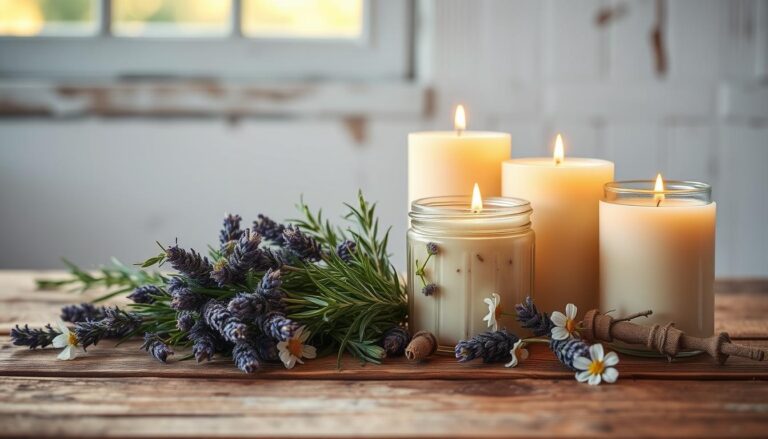What if you could harness the uplifting power of citrus to transform your mood, skin, and overall well-being? Bergamot essential oil offers a wealth of benefits and uses that can do just that.
With its fresh, citrusy scent and impressive range of therapeutic properties, bergamot essential oil has been a popular choice for aromatherapy and natural health enthusiasts for centuries.
In this article, we’ll explore the top 10 benefits and uses of bergamot essential oil, from reducing stress and anxiety to promoting healthy skin and hair.
Whether you’re looking to boost your mood, alleviate digestive issues, or simply enjoy the invigorating scent of citrus, bergamot essential oil is a versatile and natural solution that’s sure to delight.
Get ready to discover the many wonders of this incredible essential oil!
Key Takeaways
- Originates from Southern Italy’s sun-drenched citrus groves
- Combines fresh citrus notes with delicate floral undertones
- Used historically in traditional medicine and premium teas
- Contains flavonoids that promote wellness from within
- Versatile applications in aromatherapy and topical blends
- Gained modern recognition for stress-relief properties
- Requires proper dilution for safe daily use
10 Uses and Benefits of Bergamot Essential Oil in Living Spaces
Mood Elevation & Emotional Brightening
Bergamot’s crisp citrus-floral aroma can lift spirits, dispel sadness, and create a cheerful atmosphere, making it ideal for morning diffusing in kitchens or living rooms.
Cozy Evening Vibes (When Paired with Woods or Vanillas)
When blended with oils like Cedarwood, Sandalwood, or Vanilla, bergamot adds a warm, comforting top note, perfect for cozy, candle-lit evenings.
Stress Reduction & Mental Unwinding
Bergamot promotes calmness without sedation, making it ideal for spaces like bedrooms or reading nooks where you want relaxed alertness rather than deep sleep.
Spa-Like Atmosphere
Its inclusion in bathroom diffusers or shower melts gives your space a high-end spa feel, encouraging deep breathing and emotional release.
Emotional Balance in Shared Spaces
Because it’s both uplifting and calming, bergamot helps regulate the mood in social rooms like living rooms or offices, making it easier to foster connection and harmony.
Fresh, Clean Morning Wake-Up Scent
Diffused in the morning with lemon or mint, bergamot brings a crisp, bright freshness that gently stimulates wakefulness without harshness.
Air Freshening & Odor Elimination
Its slightly astringent, citrus character is excellent for cleansing stale air, especially in entryways, kitchens, or pet areas.
Enhancing Focus & Mindfulness
Its subtle floral depth and citrus clarity make it perfect for diffusing during journaling, meditation, or yoga, creating a focused yet emotionally open atmosphere.
Creative Energy Boost
Use bergamot in creative workspaces to gently stimulate imagination and encourage flow, without the sharpness of peppermint or the heaviness of deeper oils.
Transition Scent for Evening Wind-Down
Diffusing bergamot with lavender in the early evening helps signal the shift from activity to rest, making it a great transitional scent between daytime and nighttime modes.
Uncovering the Magic of Bergamot
Imagine holding sunshine in a bottle.
That’s bergamot essential oil.
This Italian citrus gem isn’t your average kitchen fruit. Its secret lies in the Calabrian soil, where Mediterranean breezes shape its complex aroma and potent compounds.
What Makes This Citrus Star Shine?
Bergamot’s magic comes from rare plant chemicals like limonene and linalool.
These compounds create a scent that’s both zesty and soothing. While lemon wakes you up and lavender chills you out, bergamot does both.
It’s like nature’s mood-balancing act.
| Citrus Oil | Key Compounds | Primary Effects |
|---|---|---|
| Bergamot | Limonene, Linalool | Energy + Calm |
| Lemon | Limonene | Focus Boost |
| Orange | Myrcene | Mood Lift |
Why Everyone’s Reaching for Essential Oils
You’ve probably noticed oils popping up everywhere, from yoga studios to office desks.
People want real solutions, not quick fixes. Bergamot leads this charge because it works with your body, not against it.
New cold-press methods capture more goodness than old distillation techniques.
Your morning routine could use this citrus upgrade. Add a drop to your shower floor or mix with coconut oil for a fresh perfume.
Just remember: quality matters.
Look for dark glass bottles and purity guarantees.

Discovering the Historical Roots and Cultural Impact of Bergamot
Unraveling the past of bergamot feels like decoding a fragrant mystery.
This citrus fruit (Citrus bergamia) traveled through time and empires before settling in Southern Italy.
Some historians argue Crusaders brought it from Asia Minor, while others credit Christopher Columbus with introducing it from the Canary Islands.
Bergamot in Traditional Italian Medicine
Calabrian healers valued bergamot long before modern aromatherapy.
Families passed down recipes using the citrus fruit peel for digestive support and wound care.
Cold-pressed oil became a staple in herbal compresses, blending with local olive oil for massage blends.
The Role of Bergamot in Earl Grey Tea
Your favorite Earl Grey owes its flavor to a 19th-century British twist.
Legend says a Chinese tea master gifted the blend to Earl Charles Grey after a diplomatic mission.
The bergamot-infused black tea became a royal favorite, its citrus notes cutting through the bitterness of Assam leaves.
Today, this grey tea remains a global phenomenon.
From London tearooms to New York cafes, that distinctive aroma signals quality. Modern versions even use bergamot zest as garnish, connecting drinkers to centuries of tradition.
Exploring the Benefits of Bergamot Essential Oil
Your wellness toolkit might be missing its star player.
This citrus-derived powerhouse works overtime to address modern challenges, blending ancient wisdom with contemporary needs.
Let’s uncover its dual role in enhancing physical and emotional well-being.
How Bergamot Supports Your Health
Struggling with tension? A whiff of this oil could calm your racing mind.
Studies suggest its aroma interacts with brain receptors linked to stress response. For digestive discomfort, diluted versions mixed with carrier oils may ease cramping when massaged clockwise on your abdomen.
Skin concerns like redness or irritation often respond well to properly diluted formulas.
Always pair with sunscreen since the photosensitive nature of bergamot means UV protection becomes non-negotiable after application.
Surprising Uses You’ll Love
Transform bedtime routines by adding two drops to cotton balls near your pillow.
The gentle fragrance creates sleep-friendly vibes without overwhelming your senses. For home freshness, combine with white vinegar for a citrusy cleaning spray that leaves surfaces gleaming.
Feeling creatively blocked? Diffuse bergamot during brainstorming sessions. Its bright yet grounding aroma helps spark ideas while keeping anxiety at bay.
Remember to store bottles away from direct sunlight to preserve potency.

Scientific Insights into the Benefits of Bergamot
Modern science is catching up to what traditional healers knew centuries ago. Rigorous studies now reveal how this citrus extract interacts with your body at cellular levels.
Let’s explore the lab-tested truths behind its growing reputation.
Cholesterol and Blood Sugar Breakthroughs
Groundbreaking research shows bergamot may reshape heart health.
A 2019 review of multiple studies found daily supplementation lowered LDL cholesterol by 23% and triglycerides by 30%.
Participants also saw HDL cholesterol rise 12%—results comparable to some medications.
For those managing blood sugar, trials deliver hope. Sixty adults with type 2 diabetes took bergamot extract for a month.
Their fasting glucose levels dropped significantly, some by even 22%. These findings suggest new possibilities for metabolic support.
Nature’s Defense Team at Work
The secret lies in bergamot’s polyphenol army.
These antioxidant compounds, including rare flavonoids like brutieridin, combat oxidative stress better than many fruits.
Research confirms they neutralize free radicals 40% faster than standard vitamin C supplements.
What the Data Tells Us
Recent studies highlight two key patterns. First, effects intensify with consistent use—30 days appears optimal. Second, higher polyphenol concentrations yield better results.
A 2021 trial showed 1000mg daily doses improved three heart health markers simultaneously.
Scientists continue uncovering applications.
Ongoing research explores the hidden potential of bergamot to reduce inflammation markers linked to arthritis.
Early findings suggest it might rival some OTC anti-inflammatories without gastric side effects.
Benefits of Bergamot: Real-World Applications and Tips
Your daily wellness ritual just found its new MVP.
This citrus superstar adapts to your lifestyle through multiple delivery methods, each offering unique advantages.
Let’s explore how to match bergamot to your needs.
Finding Your Perfect Match
Morning warriors might grab capsules with breakfast. Creative types could stir powder into smoothies. The table below helps you navigate options:
| Form | Serving Size | Best For |
|---|---|---|
| Capsules | 500-1000mg | Consistent daily use |
| Liquid Extract | 5-10 drops | Tea/flavor enhancement |
| Powder | 1 tsp | Drink mixes |
| Essential Oil | 2-3 drops | Aromatherapy |
Seamless Daily Integration
Pair supplements with fatty meals for better absorption. Add oil to diffusers during work hours for focus. Night owls can mix extract into chamomile tea.
For skincare, blend one drop with jojoba oil before bed. Fitness fans might add powder to post-workout shakes. Always consult your doctor if taking medications.
Consistency matters most. Stick with your chosen method for 4-12 weeks. Track changes in energy levels or mood to gauge effectiveness.
Culinary Inspirations: From Tea to Tantalizing Recipes
Bergamot zesty charm extends far beyond your teacup.
Modern kitchens are buzzing with creative ways to use this citrus star, blending tradition with bold new flavors. Let’s explore how to elevate everyday meals and drinks with its vibrant essence.
Crafting the Perfect Earl Grey Latte
Heat 100ml water until bubbles form, then steep 8g Earl Grey leaves for 4 minutes.
Add 250ml milk and warm gently—never boil. Strain into mugs, inhaling the aromatic steam. For extra flair, swirl in a drop of bergamot-infused oil.
Creative Ideas for Using Bergamot in Cooking
Grate fresh peel into shortbread dough or salad dressings.
Mix juice with honey for glazes on roasted veggies. The tart flesh works in marmalades or sorbets.
Pro tip: Balance its acidity with creamy ingredients like mascarpone or avocado.
Interested in learning about other essential oils?
Check out these resources:
FAQ
Is bergamot essential oil safe to apply directly on your skin?
Bergamot oil is phototoxic, meaning it can cause skin sensitivity when exposed to sunlight. Always dilute it with a carrier oil (like coconut or jojoba) before topical use, and avoid sun exposure for 12–24 hours after application. Opt for “bergapten-free” versions for daytime use.
How does bergamot differ from other citrus essential oils?
Unlike lemon or orange oils, bergamot has a distinct floral-citrus aroma and contains unique polyphenols like brutieridin and melitidin. These compounds are linked to its ability to support healthy cholesterol levels, making it stand out in both scent and function.
Why is bergamot a key ingredient in Earl Grey tea?
The oil from bergamot peel is used to flavor Earl Grey, giving it that iconic zesty aroma. This tradition dates back to the 1800s, when black tea was blended with bergamot to create a smoother, more fragrant brew loved worldwide.
Can bergamot help manage blood sugar levels?
Early studies suggest bergamot juice and extract may improve insulin sensitivity and reduce blood sugar spikes. Its flavonoids and antioxidants support metabolic health, but always consult your doctor before using it as a supplement.
What’s the best way to use bergamot oil for relaxation?
Add 2–3 drops to a diffuser to ease stress, or mix it with lavender oil for a calming bedtime blend. You can also dilute it in a warm bath or apply it to pulse points (like wrists) for quick mood-boosting effects.
Are there culinary uses for fresh bergamot fruit?
Yes! Its tart, floral flavor works in marmalades, salad dressings, or even baked goods. Try zesting the peel into shortbread cookies or mixing the juice into vinaigrettes for a bright, citrusy twist.





